
Epicurus was an ancient Greek philosopher and sage who founded Epicureanism, a highly influential school of philosophy. He was born on the Greek island of Samos to Athenian parents. Influenced by Democritus, Aristippus, Pyrrho, and possibly the Cynics, he turned against the Platonism of his day and established his own school, known as "the Garden", in Athens. Epicurus and his followers were known for eating simple meals and discussing a wide range of philosophical subjects. He openly allowed women and slaves to join the school as a matter of policy. Of the over 300 works said to have been written by Epicurus about various subjects, the vast majority have been destroyed. Only three letters written by him—the letters to Menoeceus, Pythocles, and Herodotus—and two collections of quotes—the Principal Doctrines and the Vatican Sayings—have survived intact, along with a few fragments of his other writings. As a result of his work's destruction, most knowledge about his philosophy is due to later authors, particularly the biographer Diogenes Laërtius, the Epicurean Roman poet Lucretius and the Epicurean philosopher Philodemus, and with hostile but largely accurate accounts by the Pyrrhonist philosopher Sextus Empiricus, and the Academic Skeptic and statesman Cicero.

Epicureanism is a system of philosophy founded around 307 BCE based upon the teachings of Epicurus, an ancient Greek philosopher. Epicurus was an atomist and materialist, following in the steps of Democritus. His materialism led him to religious skepticism and a general attack on superstition and divine intervention. Originally a challenge to Platonism, its main opponent later became Stoicism. Although Epicureanism is a form of hedonism insofar as it declares pleasure to be its sole intrinsic goal, the concept that the absence of pain and fear constitutes the greatest pleasure, and its advocacy of a simple life, make it very different from hedonism as colloquially understood. Following the Cyrenaic philosopher Aristippus, Epicurus believed that the greatest good was to seek modest, sustainable pleasure in the form of a state of ataraxia and aponia through knowledge of the workings of the world and limiting desires. Correspondingly, Epicurus and his followers generally withdrew from politics because it could lead to frustrations and ambitions that would conflict with their pursuit of virtue and peace of mind.
Hedone is the Greek word meaning "pleasure." It was an important concept in Ancient Greek philosophy, especially in the Epicurean school. It is also the root of the English word "hedonism".

Metrodorus of Lampsacus was a Greek philosopher of the Epicurean school. Although one of the four major proponents of Epicureanism, only fragments of his works remain. A Metrodorus bust was found in Velia, slightly different modeled to depict Parmenides.
Polyaenus of Lampsacus, also spelled Polyenus, was an ancient Greek mathematician and a friend of Epicurus.
Colotes of Lampsacus was a pupil of Epicurus. He wrote a work to prove "That it is impossible even to live according to the doctrines of the other philosophers" and dedicated it to Ptolemy II Philadelphus. Although this work is lost, its arguments are preserved in two works written by Plutarch in refutation of it: "That it is impossible even to live pleasantly according to Epicurus", and Against Colotes. According to Plutarch, Colotes attacked Socrates and other great philosophers in this work. Some fragments of two other works of Colotes have been discovered at the Villa of the Papyri at Herculaneum: Against Plato's Lysis, and Against Plato's Euthydemus. According to Plutarch, Colotes, upon hearing Epicurus discourse on the nature of things, fell on his knees before him, and besought Epicurus to give him instruction. Plutarch claims that Colotes was a great favorite with Epicurus, who used, by way of endearment, to call him Koλωτάρας and Koλωτάριoς. Cicero also recounts that Colotes held that it is unworthy of the truthfulness of a philosopher to use fables in his teaching, a notion which Cicero opposes.
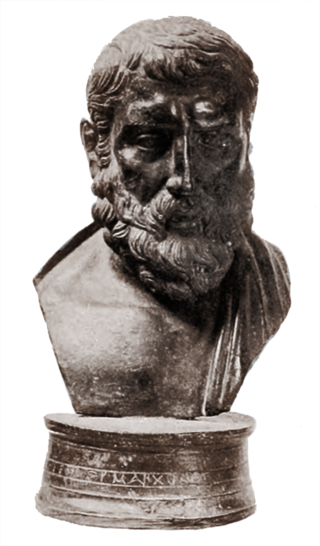
Hermarchus or Hermarch, sometimes incorrectly written Hermachus, was an Epicurean philosopher. He was the disciple and successor of Epicurus as head of the school. None of his writings survives. He wrote works directed against Plato, Aristotle, and Empedocles. A fragment from his Against Empedocles, preserved by Porphyry, discusses the need for law in society. His views on the nature of the gods are quoted by Philodemus.
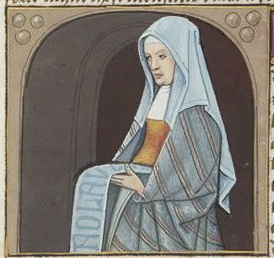
Leontion was a Greek Epicurean philosopher.
Demetrius Lacon or Demetrius of Laconia was an Epicurean philosopher, and a disciple of Protarchus. He was an older contemporary of Zeno of Sidon and a teacher of Philodemus. Sextus Empiricus quotes part of a commentary by Demetrius on Epicurus, where Demetrius interprets Epicurus' statement that "time is an accident of accidents."
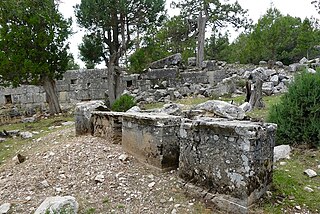
Diogenes of Oenoanda was an Epicurean Greek from the 2nd century AD who carved a summary of the philosophy of Epicurus onto a portico wall in the ancient Greek city of Oenoanda in Lycia. The surviving fragments of the wall, originally extended about 80 meters, form an important source of Epicurean philosophy. The inscription, written in Greek, sets out Epicurus' teachings on physics, epistemology, and ethics. It was originally about 25,000 words long and filled 260 square meters of wall space. Less than a third of it has been recovered.
Apollodorus was an Epicurean philosopher, and head of the Epicurean school in Athens.
Nausiphanes was an ancient Greek atomist philosopher from Teos.

Hypochrysops is a genus of butterflies in the family Lycaenidae first described by Cajetan Felder and Rudolf Felder in 1860. This particular genus is exclusive to the Australian area with only a few species straying into Papua New Guinea.
Themista of Lampsacus, the wife of Leonteus, was a student of Epicurus, early in the 3rd century BC. Epicurus' school was unusual in the 3rd century, in that it allowed women to attend, and we also hear of Leontion attending Epicurus' school around the same time. Cicero ridicules Epicurus for writing "countless volumes in praise of Themista," instead of more worthy men such as Miltiades, Themistocles or Epaminondas. Themista and Leonteus named their son Epicurus.
Leonteus of Lampsacus was a pupil of Epicurus early in the 3rd century BCE. He was the husband of Themista, who also attended Epicurus' school. Such was the esteem in which they held Epicurus that they named their son after him.
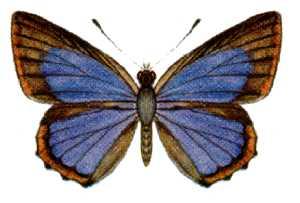
Hypochrysops halyaetus, the western jewell, is a member of the family Lycaenidae of butterflies. It lives in Australia.
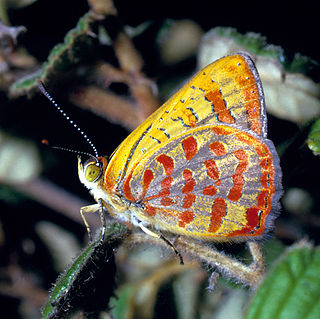
Hypochrysops byzos, the yellow-spot jewel, is a member of the family Lycaenidae. Its range consist of eastern Australia. The wingspan of both the male and female is about 3 cm.
Philonides of Laodicea in Syria, was an Epicurean philosopher and mathematician who lived in the Seleucid court during the reigns of Antiochus IV Epiphanes and Demetrius I Soter.

Hypochrysops dinawa is a species of butterfly of the family Lycaenidae. It is found from southern New Guinea to Papua New Guinea.








